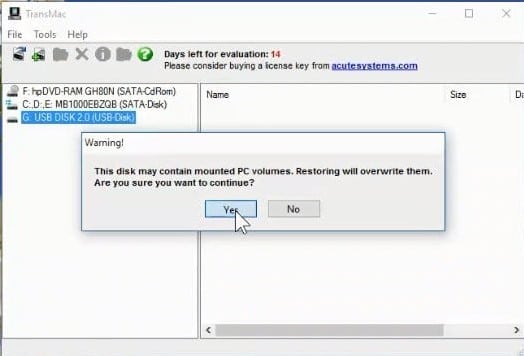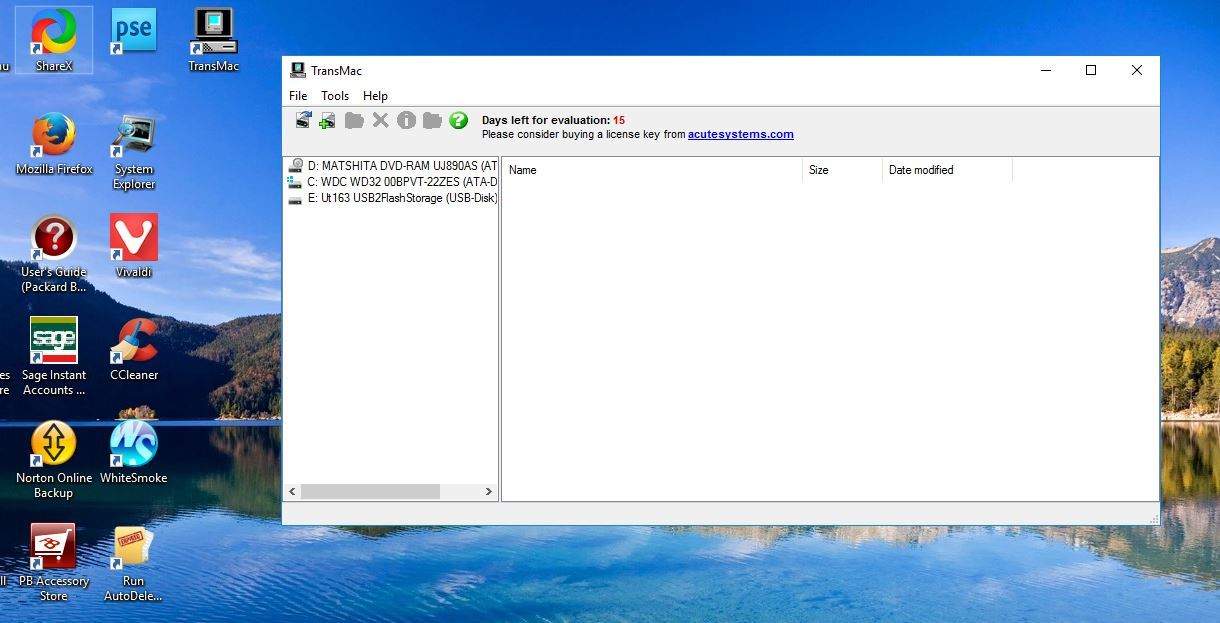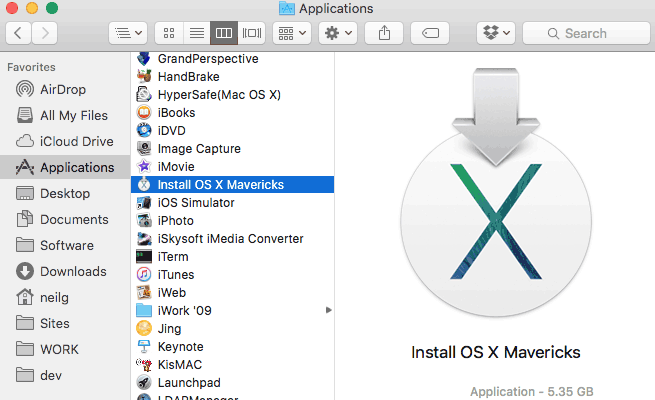Warning: Please follow these instructions at your own risk. I am not responsible for any damage or information loss that could result from following this guide. Also, note that installing OS X on PC is illegal. Please buy a real Mac if you're satisfied with your Hackintosh. This guide is for evaluation purposes only.
Requirements
My Patreon Link: USB installers for older versions of Mac OS X can be tricky, so I decided to put together a more deta. Make sure the copy of “Install OS X El Capitan” is there on /Applications folder. Bootable USB Installers for OS X Mavericks, Yosemite, El Capitan, and Sierra First, review this introductory article: Create a bootable installer for macOS. Second, see this How To outline for creating a bootable El Capitan installer.
- An Intel-based PC with UEFI bios
- A USB flash drive with at least 16GB capacity
- A dedicated hard drive (SSD highly recommended)
- A computer running OS X (10.9 or later) for preparing the installation USB flash drive
I chose to avoid the UniBeast installer (by Tonymacx86) because of its commercialized nature, as described here. Here is a vanilla guide to installing El Capitan on your PC!
Preparing the USB Installation Drive
First things first. We need to prepare a USB thumb drive that will contain the installation files as well as the bootloader and custom kexts for our specific Hackintosh build.
Download El Capitan from the Mac App Store
Head over to your existing OS X environment running 10.9 or later and open the Mac App Store.
Search for 'El Capitan' and click Download. The download is completely free if you're running OS X 10.9+.
Wait for the download to finish (this could take some time).
Format the USB Drive
Open Disk Utility in Applications/Utilities and locate your USB device. Make sure you've backed up anything important on that drive as it will be erased forever.
Select it, and then on the right, click the partition tab.
- Click Curent Layout and change it to 1 Partition.
- Set the Name to USB.
- Set the Format to Mac OS Extended (Journaled).
- Click Options and select GUID Partition Table.
Click Apply to format the drive.
Copy the Installation Files to the USB Drive
Now that we've downloaded the installation files from the Mac App Store and formatted our USB drive, let's copy the installation files to it.
Run the following command in the Terminal (Applications/Utilities):
The command will run a script inside the Install OS X El Capitan application that will copy the installation files to the USB drive.
This process takes about 15 minutes. Go out for a quick run, or a hamburger, or both. When you come back, it should have finished.
Installing a Bootloader
If you tried to boot from the USB drive as is after the previous step on a PC, it wouldn't work. We need a bootloader that makes it possible to boot OS X on x86 and x86_64 PCs.
There are 3 popular bootloaders to choose from.
- Clover
- Chameleon
- Chimera
I went with Clover as it seems to be the most popular choice among other El Capitan installers, mostly for the following reasons:
Clover is an open-source EFI-based bootloader created on Apr 4, 2011. It has a totally different approach from Chameleon and Chimera. It can emulate the EFI portion present on real Macs and boot the OS from there instead of using the regular legacy BIOS approach used by Chameleon and Chimera. For many, Clover is considered the next-gen bootloader and soon it will become the only choice since BIOS in being replaced by UEFI in every new motherboard. One big feature of Clover is that iMessage, iCloud, the Mac App Store works along with Find My Mac, Back To My Mac and FileVault since Clover can use the EFI partition. (Read more)
Install Clover on Your USB Drive
Installing Clover on your USB drive is relatively easy. It involves running an installation wizard and selecting some options.
Download the latest Clover installer from here.
- Run the installer.
- Click Continue twice.
- Click Change Install Location and set it to your formatted USB drive.
- Click Customize and check the following options:
- [x] Install for UEFI booting only
- [x] Install Clover in the ESP
- [ ] Drivers64UEFI
- [x] OsxAptioFixDrv-64 - fixes memory map created by AMI Aptio EFI. Booting OS X is impossible otherwise.
- Click Install and wait for the installation to finish. It shouldn't take more than a minute.
Copy Essential Kexts to the USB Drive
Next, we'll need to copy some kexts (kernal extensions, similar to drivers on Windows) to the USB drive.
- FakeSMC.kext - open source SMC device driver/emulator developed by netkas. Tricks OS X into thinking it's installed on Apple hardware. Absolutely required for Hackintosh installation.
- NullCPUPowerManagement.kext - disables AppleIntelCPUPowerManagement.kext which may cause kernel panics when you try to boot from the USB drive. It's optional, copy it only if you get an AppleIntelCPUPowerManagement-related kernel panic.
- ApplePS2Controller.kext and AppleACPIPS2Nub.kext - adds support for PS2 devices (such as PS2 keyboard/mouse). They're optional, copy them only if you still use PS2 devices.
Download these files from here and copy them to the EFI mounted volume at /EFI/Clover/kexts/10.11/.
Now that the installation USB drive is ready, let's install OS X El Capitan!
Boot from the USB Drive
Restart your computer and boot from the USB drive (Press Esc/F8/Del to access the boot selection menu).

Use the arrow keys to select Boot OS X Install from Install OS X El Capitan (It should be selected by default). Press the spacebar and select Boot Mac OS X in verbose mode. Verbose mode means that you'll be able to see exactly what's going on under the hood as OS X attempts to boot up its installer. You'll be able to see the exact error message if booting fails.
Press Enter and cross your fingers. Clover will now boot the installer from your USB drive. This could take some time, in my case, it takes around 5 minutes (Don't worry -- the startup time is around 5 seconds after installing on an SSD).
Did it fail?
It's more than likely that the boot will fail. Don't panic (ha-ha), as kernel panics usually mean that you forgot to copy an essential kext to the EFI partition. Look up the exact error you're getting before the boot log comes to an end and search Google for a solution.
Once you find an additional kext that your system needs, you'd attempt to copy it to the EFI volume, only to discover that it's gone! Not to worry, it's just unmounted and hidden. Follow this guide to mount the hidden partition, and then, follow the Copy Essential Kexts section above to copy it to the USB drive's EFI partition.
Format the Target Hard Drive
Once the installation wizard boots, the next step is to prepare the hard drive that you want to install OS X on.
Click Continue, followed by Disk Utility.
Select the target drive to install to (not the USB drive!) and click the Erase button. Make sure to back up anything important on that drive, as it will be deleted forever.
Create El Capitan Bootable Usb
- Set the Name to El Capitan.
- Set the Format to OS X Extended (Journaled).
- Set the Scheme to GUID Partition Map.
Click Erase to format the drive.
Install OS X to the Target Drive
Exit the Disk Utility and click Install OS X.
Click Show All Disks and select the drive you just formatted to install OS X on it. Finally, click Install.
The process takes about 25 minutes. Be patient. For me, it hung at the end ('1 second remaining') for around 5 minutes. Don't be tempted to reset or cancel the installation.
When that's done, the system will reboot. Make sure to boot from the USB device again, and select Boot OS X Install from Install OS X El Capitan once again, in verbose mode. The installation is a two-part process that continues once you re-boot into the USB drive.
Finally, after about 25 more minutes, OS X El Capitan should be successfully installed on the target drive.
Boot into El Capitan via the USB Device
After the second reboot, boot from the USB device once again, but this time, select Boot OS X from El Capitan, and select verbose mode.
Press Enter and cross your fingers again. If all goes well, you'll be presented with the setup wizard:
Take a minute to set up your new Hackintosh. Once you're done, there are a few things you need to do to finish off the installation.
Reinstall Clover on the Hackintosh Drive

In the previous step, we used Clover on our USB drive to boot our Hackintosh. This is fine, but most of us aren't going to keep that USB drive plugged in forever. Let's make it possible to boot El Capitan independently by reinstalling Clover on it.
Go back up to the Install Clover on Your USB Drive section and follow the steps again, but this time, select your El Capitan volume instead of the USB drive.
Once again, copy the essential kexts to the EFI partition that shows up after installing Clover.
Finally, make sure to add Clover EFI boot options which is possible by pressing Clover Boot Options in the Clover boot window (if there are 2 boot options -- find the one for your SATA drive). I literally spent 3 hours figuring out why Clover would not boot when I disconnected the USB drive before I figured out that I need to manually add the EFI boot options.
Make Bootable El Capitan Installer On Windows
Now you'll be able to boot directly from the El Capitan hard drive, as it should be!
Audio and Networking

If you're lucky, audio and networking will work right out of the box. If not, you're on your own from here. You'll need to research your exact hardware (by using System Information in Applications/Utilities) and searching Google to find the right kext or installer to make it work on El Capitan.
Clover Themes
The default Clover theme is pretty ugly (no offense). Check out this theme database to improve Clover's appearance.
This is YosemiteLogin by xenatt:
Enjoy!
That's it! Enjoy your new Hackintosh, and if you absolutely love it, consider buying a Mac!

El Capitan Bootable Usb Installer
How To Create Bootable USB Installer For MacOS X El …
Creating bootable USB Installer can be done in different ways specifically create bootable USB Installer for macOS X El Capitan on Windows and other macOS versions. The first way to do manually and the second way is to do a software that is pre-build to do all those with a click or two.
How to Create OS X El Capitan Bootable USB Disk?
We are now ready to create the bootable usb disk drive of OS X El Capitan. All you have do is, follow the couple of steps suggested here and you are ready to install El Capitan on any mac computers. Step 1 : Connect USB Disk Drive to your mac computer and Open “Disk Utility” by typing it on Spotlight (CMD + Space Bar) or by going to “Applications – Utilities – Disk Utility”.
How to Create a Bootable USB with macOS Installer
· OS X El Capitan Create bootable USB drive with Mac Disk Utility Now that you have the installation files ready on your Mac, you can move them to your USB drive for future use. To install macOS on an external hard drive: 1. Connect the USB to your MacBook 3.
How to create a bootable installer for macOS
Download: OS X El Capitan This downloads as a disk image named InstallMacOSX.dmg. On a Mac that is compatible with El Capitan, open the disk image and run the installer within, named InstallMacOSX.pkg. It installs an app named Install OS X El Capitan
El Capitan Usb Installer
How to Create an OS X El Capitan Install Disk on a …
· The installer you create can be used to install OS X El Capitan 10.11 on any eligible Mac computer. X Research source This is a more convent and less time consuming way to install OS X El Capitan on multiple machines, gives you a handy emergency disk, and enables a fresh OS X install.
Creating a bootable El Capitan ISO image
It’s very easy to create a bootable ISO image of El Capitan, if you have a working El Capitan system installed on your machine. Start with going to AppStore and installing El Capitan, so you’ll have an application named Install El Capitan in your Application list. Then
Create Bootable Usb From Dmg El Capitan
Create Bootable El Capitan USB Install Drive with DiskMaker X for Mac Thursday, October 1st, 2015 Author: Dan @ MacSales.com. UPDATE 09/2018: Create a Bootable macOS Mojave Install Drive with DiskMaker X 8 UPDATE 09/2017: Create a Bootable
How to install macOS from a USB
· can only create a bootable installer for macOS Big Sur, Catalina, Mojave, High Sierra, or El download from a Mac that is using macOS Sierra 10.12.5 or later, or El Capitan 10.11.6. Enterprise
How To Create El Capitan Bootable Usb From Dmg
How To Create El Capitan Bootable Usb From Dmg Master Guardian Ii Vs Dmg Skyrin Ibflect Dmg On Urself Download Xcode Dmg From App Store Dmg Room Types Dungeons And Dragons Dungeon Generator High Sierra Dmg To Usb How To Add Apple
El Capitan Bootable Disk Installer
Creating a Bootable Flash Drive With OS X Lion
· OS X Lion does not come with a bootable installer, but with the help of this guide, you can create your own bootable Lion installer on a USB drive. Make Sure Your USB Drive Is Formatted for a Mac Not all USB drives can be used with a Mac right out of the box. If
How to Create Bootable USB Installer for Mac Using …
Create Bootable USB Installer for Mac OS Using UniBeast The first task that you’re going to do is open the Apple App Store. The store will open up after some seconds and tap on “ Featured ” then click on the “ OS X El Capitan “.
How to create a bootable installer for macOS
How to create a bootable installer for macOS, Programmer Sought, the best programmer technical posts sharing site. Use the bootable installer Determine whether you’re using a Mac with Apple silicon, then follow the appropriate steps: Apple silicon Plug the
Unable to create El Capitan Bootable USB
· All I’m trying to do is create a bootable El Capitan USB :-(. Can anyone offer some help please ? CoastalOR macrumors 68030 Jan 19, 2015 2,844 1,044 Oregon, USA May 7, 2018 #2 I’ve only used sudo per Apples instructions.
Install El Capitan From Usb
El Capitan From Usb Mac OS X Utilities I But i am helpless as there are no servicing centre of apple in Bangladesh. In this article, you are going to learn how to create bootable USB for Mac OS in case you dont have a Mac computer.
Os X El Capitan 10.11.0 Bootable Usb Dmg File
Oct 04, 2015 As usual, Apple no longer supply a bootable USB Flash Drive with latest OS X releases – including the new OS X 10.11 El Capitan. Using this tutorial you will be able to create your very own.